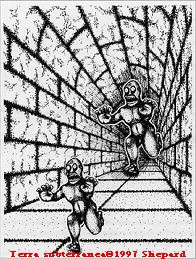Unit 7: Perception (cont.)
|
Perceptual Constancies Perceiving objects as unchanging (having constant lightness, color, shape, and size) even when our retinal images of them change. For example: Shape Constancy: We perceive the form of familiar objects as constant even when our retinal images of them change. Size Constancy: We perceive familiar objects to maintain a constant size even when their distance from us changes. Lightness Constancy: We perceive an object as having a constant lightness even when its illumination varies.
Some Visual Illusions
**Please see your textbook for explanations of these illusions.
Sensory Deprivation |
Similarly, Blakemore & Cooper
found that kittens whose vision was restricted to only seeing vertical
lines during a critical period of development, later could not
see horizontal lines. Perceptual Adaptation: In vision, the ability to adjust to an artificially displaced or even inverted visual field. Perceptual Set: A mental predisposition to perceive one thing and not another (e.g., seeing the Lock Ness Monster instead of a piece of driftwood because of your beliefs). Context Effects: Any given stimulus may trigger radically different perceptions depending on the surrounding environment or circumstances. Culture may have a great impact on context and perception. Human Factors Psychology: A branch of psychology that explores how people and machines interact and how machines and physical environments can be adapted to human behaviors.
Extrasensory Perception (ESP) See HANDOUTS |



